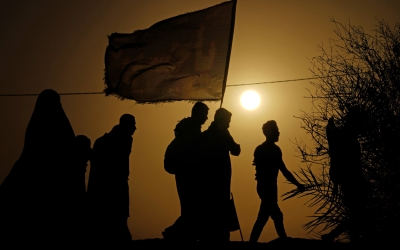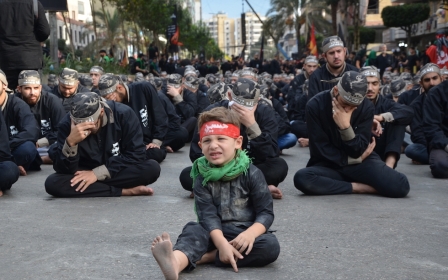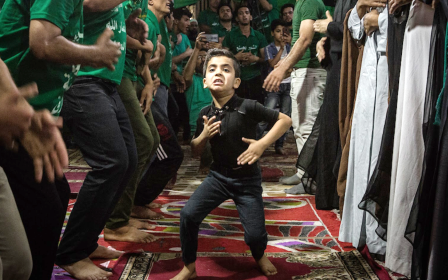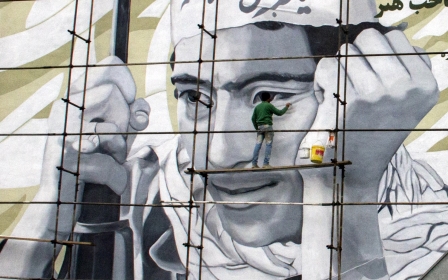The increasing politicisation of Iran's Muharram singers
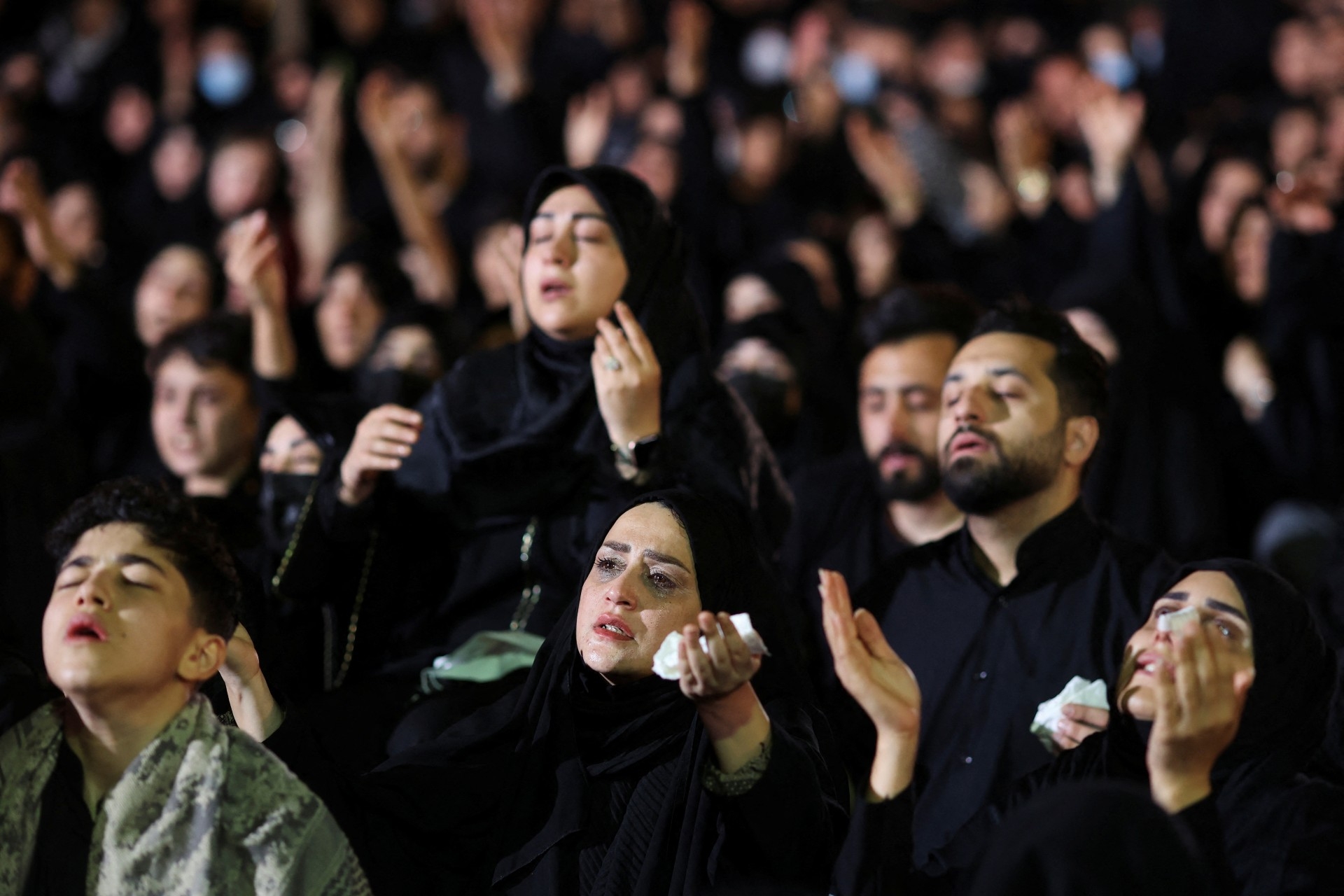
Every year, in the holy Islamic month of Muharram, Iranians don black shirts and participate in special mourning ceremonies to pay homage to Hussein bin Ali, the third Shia imam who, along with his 72 companions, was martyred during the battle of Karbala in 680 AD.
The mourning ceremonies are usually led by a eulogist, or religious singer, who sings about the sufferings of Imam Hussein, who is a symbol of resistance for Muslim Shias.
In recent decades, religious singers have turned into a strong and influential group who are considered close to the Islamic Republic's establishment and the principlists, who are also known as conservatives.
Mahmoud Karimi, Saeed Haddadian, Mohammad Taheri, Mansour Arzi, Majid Banifateme, Abdulreza Helali, and Mahdi Rasouli are among the most prominent religious singers in Iran who are sometimes invited to the Supreme Leader Ayatollah Ali Khamenei’s Muharram ceremonies.
These singers have always been under media scrutiny as they frequently cause an uproar following controversial actions or statements.
In one instance in 2013, Karimi, who is also a rich factory owner, was in a car accident late at night, and instead of resolving the argument through established means, the religious chanter shot in the direction of the other car with an illegal gun.
A report of the incident, which was leaked to the media, caused a huge embarrassment for Karimi and the principlists who were defending him.
Over the years, the status of religious singers in Iran has transformed into a lucrative business.
Before the 1979 Islamic Revolution, chanters usually only sang for the sake of Imam Hussain and did not turn their position in society into a profitable job. Nowadays, however, eulogists have turned into businessmen who receive up to $2,000 for one or two hours per night.
Eulogists to the principlists
Reformists and other Iranians have criticised the empowerment of eulogists by the establishment and principlists, maintaining that such moves will eventually undermine people’s belief in Islam.
This year, Muharram ceremonies have turned controversial with principlist eulogists singing for the Islamic Republic instead of Imam Hussein.
“Unfortunately, a large number of religious singers act like pawns of the establishment, the principlist government of President Ebrahim Raisi and principlists, but they don’t understand to what extent they damage people’s beliefs,” a senior journalist of a reformist newspaper in Iran told Middle East Eye.
“Years ago, before the 1979 revolution, when the US-backed Shah wanted to move forward with his plans to crush his opponents, he used some thugs like ‘Shaban the brainless’, and he was quite successful.”
Similarly, the journalist said, principlists today are using some eulogists as instruments to suppress and attack their opponents.
“Religious singers have a remarkable influence in society, mostly among the religious class. So, they can indoctrinate the ideas of both principlists and the establishment in the minds of many people who only take part in the mourning ceremonies to pay respect to their Imam,” he added.
Politicised mourning
“Allah is great, Khamenei is the leader…the only headquarters of the enemies are their graves and coffins,” sang Maysam Motiee, a famous eulogist, to a large group of people who had come to mourn their imam.
Morteza Hashemi, a sociologist, tweeted that in addition to evoking the remembrance of Imam Hussein, one of the roles of eulogists during the ceremony is to address social issues, such as helping the poor.
“This [eulogy] genre came into existence with the [1980 Iran-Iraq] war. But Maysam Motiee is the comedy version of this genre who only reads his own political statement in a sad tone without any mention of [Imam Hussein],” Hashemi wrote.
'I no longer take part in the Muharram ceremonies even while still strongly believing in Imam Hussein and weeping for his sufferings'
- Farzad
However, principlists and their supporters are happy with the new approach of some religious singers.
An Iranian user on Twitter wrote: “when I listened to Maysam Motiee’s eulogy, I found out where the attacks against him are coming from. Pro-west people are upset with [Motiee’s song] against America and Israel.”
Another religious singer, Abouzar Rouhi, meanwhile, sang: “fight for your values with your cellphone… your personal account must turn into a tragedy for the enemy.”
Politicising the mourning service has left some Iranians feeling alienated from the original purpose of the ceremonies.
“It has been a few years that I no longer take part in the Muharram ceremonies even while still strongly believing in Imam Hussein and weeping for his sufferings,” Farzad, 28, an accountant, told MEE.
“But unfortunately, the mourning ceremonies have gone fully political. That’s why I have decided not to attend them anymore as singers seem to want to take advantage of us in the interest of the government.”
Turning a blind eye
As Iran’s economic situation continues to deteriorate, eulogists have come under pressure from the media and other critics for their lack of attention to people’s poor quality of life.
Prices have skyrocketed in the past year, with the cost of some food items going up 300 percent.
'If a religious singer speaks in favour of the people and slams the officials for the bad economic situation, he will face serious problems'
- Anonymous eulogist
Jafar Akbarzadeh, a religious singer, told a local outlet that he has not heard religious singers decry the economic situation.
“They are told not to speak in the context of criticising the government in order to prevent the enemy from taking advantage of this issue,” Akhbarzadeh said.
One eulogist in Tehran, who preferred not to be named, told MEE that the famous chanters among them enjoy a good personal financial situation, provided that they stay on the government’s right side.
“A person who lives in the best part of the city cannot talk about the oppressed people,” he said.
“If a religious singer with no ties to the government and principlists speaks in favour of the people and slams the officials for the bad economic situation, he will come under fire and will face serious problems.
“However, if that person is Saeed Haddadian, who of course doesn’t speak out against the principlist government, he will not have to deal with any trouble.”
Censorship
While the government is benefiting from eulogists, there are a number of religious singers who have become a source of concern as they seek to remain independent and keep a distance from the establishment.
In this vein, their songs and poems indirectly point at similarities between the Umayyad caliph Yazid, whose army slaughtered Imam Hussein's camp, and the current Iranian government and principlists.
In the last two years, the Muharram ceremonies of Yazd, a reformist province, have become highly popular and famous even among those who are not interested in such gatherings.
This has led the government to cancel the two popular ceremonies in Yazd this year.
One local media outlet, Etemad, reported that the pressure of some state-run institutions on the Muharram ceremonies has become such that they even change the text of the songs to what suits their line.
“In addition to censoring words, they have also banned some eulogists,” the report said.
Middle East Eye delivers independent and unrivalled coverage and analysis of the Middle East, North Africa and beyond. To learn more about republishing this content and the associated fees, please fill out this form. More about MEE can be found here.



